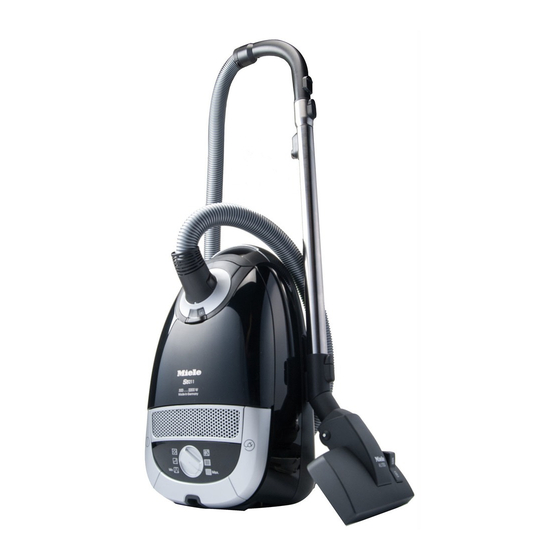Miele S 5211 Betriebsanleitung - Seite 8
Blättern Sie online oder laden Sie pdf Betriebsanleitung für Staubsauger Miele S 5211 herunter. Miele S 5211 36 Seiten. Vacuum cleaners
Auch für Miele S 5211: Broschüre (12 seiten), Betriebsanleitung (40 seiten), Betriebsanleitung (44 seiten), Betriebsanleitung (48 seiten)

Warning and Safety instructions
Correct use
~
To avoid the risk of damage, do not
use the vacuum cleaner without the
dustbag, dust compartment filter and
exhaust filter in place.
~
If a dustbag is not inserted, the dust
compartment cover cannot be closed.
Do not force it.
~
Do not vacuum up anything which
has been burning or is still glowing e.g.
cigarettes, ashes or coal, even if
apparently extinguished. The vacuum
cleaner might catch fire.
~
Do not vacuum up any water, liquid
or damp dirt. This will cause major
faults and could seriously impair the
functioning and electrical safety of the
appliance. Wait until any freshly
cleaned or shampooed carpets or floor
coverings are completely dry before
attempting to vacuum.
~
Do not vacuum toner dust. Toner,
such as that used in printers and
photocopiers, can conduct electricity.
The filter system in the vacuum cleaner
may not filter it completely, causing the
toner to be blown back into the room by
the fan.
~
Do not vacuum up any inflammable
or combustible liquids or gases and do
not vacuum in areas where such
substances are stored. The vacuum
cleaner might explode.
8
~
Do not vacuum up items which are
heavy, hard or have sharp edges. They
could cause a blockage and damage
the appliance.
~
Floor attachments, accessories and
tubes must not be used at head level to
avoid the risk of injury, e.g. to eyes and
ears.
~
Monitor the change dustbag
indicator and change the dustbag if
necessary.
Check the exhaust and dust
compartment filters at the same time
and change them too if necessary. A
full bag or blocked filter will reduce the
suction power of the vacuum cleaner. A
temperature limiter switches the
vacuum cleaner off automatically if it
gets too hot. See "Problem solving
guide".
~
Important information on the
handling of batteries (for models with
radio controls on the handle):
– Do not short circuit or recharge
batteries, or throw them into a fire.
Danger of explosion!
– Disposing of batteries: Remove the
batteries from the radio control
handle and dispose of them at a
local battery recycling bin. Do not
dispose of them with the normal
household waste.
